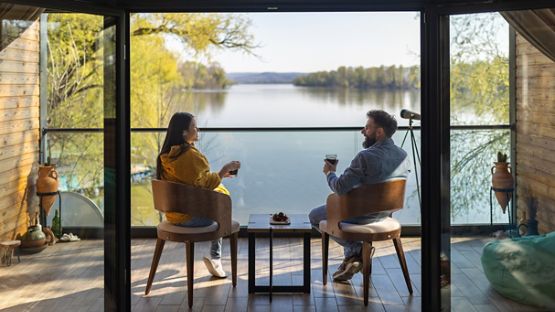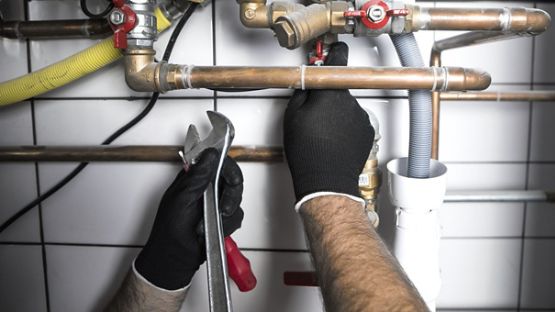Owning a home is a significant milestone, but with that achievement comes the need to protect your valuable asset. Home insurance is one of the most important safeguards you can have, yet some homeowners may question its necessity. What happens if you don’t have home insurance?
While home insurance isn't mandatory in Canada, your mortgage lender may require it. Moreover, the benefits of having home insurance may just outweigh the risks of not having it. Without insurance, you risk a mix of financial and legal vulnerability and long-term impacts on your property’s value. However, with the right coverage, you can rest easy knowing you have help to cover expenses related to sudden or accidental property damage and liability.
Key takeaways
- Unlike car insurance, home insurance isn't legally required in Canada. However, not having it can lead to financial vulnerability, especially in cases of property damage, theft or liability claims.
- If you have a mortgage, your lender will likely require home insurance to protect their investment. Failing to maintain it can result in costly lender-imposed policies.
- To ensure you have the right protection, create a home inventory, consider necessary add-ons and consult with an insurance representative to tailor coverage to your needs and budget.
Legal requirements and mortgage obligations
In Canada, home insurance is not legally mandated by the government. However, this doesn’t mean you can easily choose to forgo it or that you should.
Mortgage lender requirements
Home insurance is often a requirement imposed by mortgage lenders. While it’s not illegal to own a home without insurance, it’s rare to find a mortgage lender who will grant a mortgage without requiring insurance as part of the agreement. Most mortgage lenders require this to protect their investment in your property.
If you have a mortgage on your home, failing to maintain home insurance can have serious consequences. Most mortgage agreements include clauses that require you to carry insurance. If you let your policy lapse, your mortgage company may take out a policy on your behalf — at a significantly higher cost and pass this cost on to you. This “force-placed” insurance typically only covers the lender’s interest, leaving you responsible for damages to your personal belongings or liability claims.
Know the difference: Mortgage insurance versus homeowners insurance
Mortgage insurance and homeowners insurance are both linked to homeownership, but they serve distinct purposes. Homeowners may have both types of insurance at the same time.
Mortgage insurance is designed to protect the lender, not the homeowner. This insurance covers the lender’s financial interest if the homeowner defaults on the mortgage. It’s an additional cost, either added to the monthly mortgage payment or paid upfront at closing, and it can sometimes be cancelled once a certain equity threshold is reached.
On the other hand, homeowners insurance is intended to protect the homeowner and their property. It provides coverage for damages to the home from events like fire or theft, as well as protection for personal belongings and liability coverage in case someone is injured on the property. Unlike mortgage insurance, homeowners insurance is often required by lenders but is primarily for the homeowner’s benefit. It’s paid as a regular premium and remains in effect as long as the premiums are up to date.
Risks of not having homeowners insurance
Home insurance provides many benefits because it's designed to help safeguard your valuable investment. Should you decide not to have insurance, here are some of the common risks:
Cost of out-of-pocket damages
One of the main purposes of home insurance is to cushion financial losses caused by damages to your home, including the repair and replacement of damaged areas or items. If you consider how insurance companies determine the replacement value of a home and calculate the cost to replace or fix any damages, you're probably looking at a large amount of money.
Without a home insurance policy, you'll be responsible for covering all the expenses to get your place fixed up. Homeowners insurance can offer financial protection to cover some of the out-of-pocket expenses so that you can get your property back in tip-top shape.
No liability protection
Basic home insurance plans generally include liability coverage, which protects you from any injuries accidentally caused to a person visiting your house or damages you accidentally caused to another person's property. This means that if someone is injured on your property, your insurance will cover their medical expenses and any legal fees (up to the liability limit selected) if they decide to sue.
If you don't have home insurance, you might have to pay the injured person's medical bills or shoulder any litigation fees.
Loss of personal items
Your home is filled with personal belongings, including furniture, electronics, clothing and more. These are often collected over a lifetime and even handed down from one generation to the next. Home insurance doesn’t just protect your home. It includes coverage for your personal belongings in case they're damaged by perils covered in your policy.
You can also get additional coverage that extends protection to expensive items like jewellery or artwork. Without home insurance, you'll have to deal with the loss of your things and pay to get them back yourself.
Scenarios where home insurance is essential
You may consider yourself a responsible homeowner, think you live in a safe neighbourhood, and figure that the risks of going uninsured (or underinsured) are minimal. It’s important to remember that you can’t control every possible risk, and while steps can be taken to protect your home from fire, flood or even break-ins, nothing is infallible.
Having insurance is like backing up your hard drive. Sure, you hope your computer never crashes or gets hacked, but if it does, most important files are still protected.
Natural disasters
Canada is no stranger to natural disasters, from wildfires to overland floods. If your home or its contents are damaged or destroyed by a natural disaster, and you don’t have insurance, you’re responsible for covering all repair and rebuilding costs. This can be financially devastating, especially when combined with the emotional toll of losing your home.
Accidental damage
Accidents happen and when they do, the costs can add up quickly. Whether it’s a kitchen fire that causes extensive smoke damage or a burst pipe that floods your basement, the financial consequences of accidental damage can be overwhelming without insurance. Home insurance provides a safety net, covering the costs of repairs and helping you get back on your feet.
Third-party injuries
If a guest is injured on your property—say they slip on an icy walkway or trip over a loose carpet—you could be held liable for their medical expenses and any associated legal fees. Without home insurance, you’d be responsible for covering these costs out of pocket, which could lead to significant financial strain.
Debunking myths about home insurance
When it comes to home insurance, some homeowners believe they can safely skip coverage or settle for minimal protection. Let’s debunk some of the most prevalent myths about home insurance and explain why relying on these false beliefs can lead to being underinsured or, worse, completely unprotected.
‘I’m careful, so I don’t need it’
Myth: Many believe that being cautious and taking preventive measures will protect them from all risks.
Reality: Even the most careful homeowners can’t control external factors like natural disasters, theft or accidents. Home insurance is essential for covering these unpredictable events.
‘It’s too expensive’
Myth: Some homeowners assume that home insurance is prohibitively expensive and not worth the cost.
Reality: While premiums vary, the cost of home insurance is often a fraction of the potential out-of-pocket expenses for repairs, replacement or liability claims after an incident. Skipping insurance to save money can lead to far greater financial loss.
‘My home is new, so nothing will go wrong’
Myth: New homeowners might think their home’s new construction and modern systems make it less prone to damage or loss.
Reality: Even new homes are vulnerable to risks like fires, storms or burglaries. Home insurance protects against these risks, regardless of a home’s age.
‘I don’t have enough valuable possessions to insure’
Myth: Some people believe that since they don’t own expensive items, they don’t need home insurance.
Reality: Home insurance covers more than just valuable possessions. It also protects the structure of your home, provides liability coverage and helps with additional living expenses if you need to temporarily relocate due to damage. Moreover, even if your stuff isn’t ‘fancy,’ replacing it all at once can add up to a hefty price tag.
‘I can’t afford insurance right now’
Myth: Some believe that home insurance is a luxury they can delay purchasing until they have more disposable income.
Reality: The financial impact of a loss without insurance is often far more costly than the premiums themselves. Skipping insurance to save money in the short term can result in severe financial hardship later on.
‘I have enough savings to cover any losses’
Myth: Some homeowners believe they have enough savings to cover any potential losses, making insurance unnecessary.
Reality: Most homeowners simply don’t have enough savings to cover losses, or using those savings means eating into money better put to other life events (retirement, education, investments, etc.). Even if you feel well-off, the costs of repairing or rebuilding a home, replacing personal items or handling liability claims can quickly deplete savings, leaving homeowners in financial ruin. Insurance spreads the risk, making it more manageable.
How to ensure you have adequate home insurance
It's always a good idea to have home insurance for your property. By taking out a policy, you're protecting yourself, your belongings and the people you love from unexpected accidents.
When choosing a homeowners insurance policy, consider your level of risk and determine your specific coverage needs. Most home insurance covers the basics, such as physical damage to your home or property, loss of personal belongings and personal liability. While this may be enough for some homeowners, it's good to explore your options and other additional coverages.
- Create a detailed home inventory: This list should include all your personal property, their estimated value and any receipts or appraisals. A home inventory helps ensure that you’re fully covered in the event of a loss and can simplify the claims process.
- Consider insurance add-ons that may be necessary for your situation: For example, if you live in an area prone to flooding, adding overland water insurance and sewer backup to your home insurance coverage could be a wise decision. Other add-ons might include coverage for expensive personal items like jewellery or additional liability protection if you have a home office or rent out part of your property.
To make sure your policy fits your unique needs, discuss your options with an insurance representative. They can help you find the best solution for you, your home and your budget, ensuring you’re fully protected against any unexpected events.













